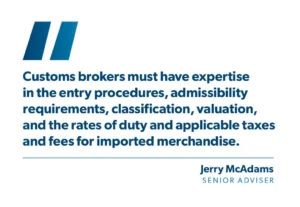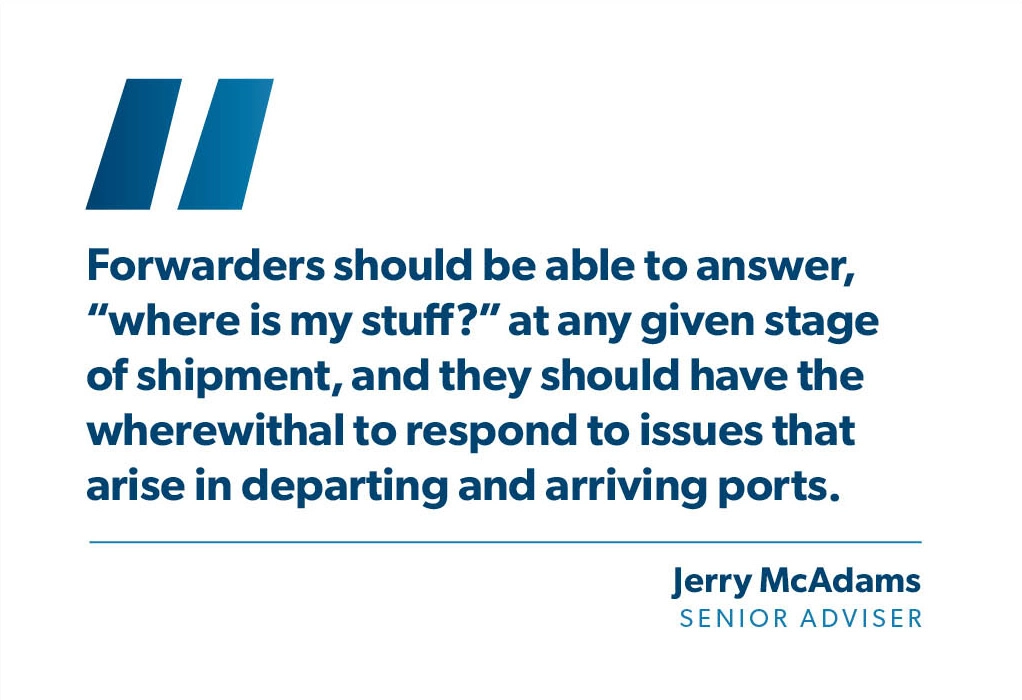What is a Licensed Customs Broker and what types of matters are you able to advise clients on in that capacity?
Customs brokers are private individuals, partnerships, associations or corporations licensed, regulated and empowered by U.S. Customs and Border Protection (CBP) to assist importers and exporters in meeting Federal requirements governing imports and exports. Customs brokers with power of attorney can submit necessary information and appropriate payments to CBP on behalf of their clients and charge them a fee for this service.
Customs brokers must have expertise in the entry procedures, admissibility requirements, classification, valuation, and the rates of duty and applicable taxes and fees for imported merchandise.
Given your background shaping compliance processes across major Free Trade Agreements (FTAs) like NAFTA, CAFTA, Korea, Singapore, and Australia, how are recent updates influencing supply‑chain operations and duty savings strategies?
One key focus in U.S. trade negotiations is to modify country of origin rules to disadvantage sourcing of components from China. Nothing is official yet, but the deal announcements clearly target sourcing from China.
It appears that tariffs are going up, notwithstanding the existence of an FTA. The previously announced reciprocal tariff plans are the starting point, but a 10% tariff will probably be the least outcome.
Shorter term options include:
- Foreign trade zones (FTZs), in which tariffs are not due until goods are entered into U.S. commerce. If the goods are exported from FTZ’s, no duty is owed. If the tariffs on components are higher than the finished good, then the tariff burden could be reduced by paying duty on the final manufactured good.
- Bonded warehouses, in which goods are stored under customs supervision for up to 5 years, and duty is paid when goods are entered into U.S. commerce. This allows inventory staging to manage tariff fluctuations. As in FTZ’s, no tariff is owed if the goods are exported from the U.S.
Longer term options include:
- Contract manufacturing or joint ventures in tariff advantaged countries.
- Tariff engineering to modify materials (think: reducing steel and aluminum content to reduce the impact of Section 301 tariffs).
- Utilizing the “First Sale” rule, which allows importers to use the price of the first sale to calculate customs duties if a multi-tiered transaction takes place.
You’ve worked with industries ranging from petrochemicals to bioscience and e‑retail. What common challenges do companies in these sectors face today when harmonizing HTS codes and navigating tariff classification disputes?
The first challenge is to take ownership of tariff classifications and not rely solely on suppliers, customs brokers, or freight forwarders. Companies have better knowledge than these providers who may be acting with good intention but incomplete information.
Next is to scrutinize current classification of goods crossing borders, and to do so with independent expertise to vet current classifications using technical knowledge, applying classification rules, and reviewing pertinent tariff classifications rulings of the U.S. Customs and Border Protection (CBP).
Finally, any potential classification change must be reviewed with legal counsel to effect two possible outcomes: 1) the new classification may result in reduced tariff and possible refunds, or 2) the new classification may result in higher tariff that would require “prior disclosure” and payment of tariff owed.
Duty drawback and Incoterms® 2020 are among your key advisory areas. How can companies best leverage these tools now to optimize cross‑border cost efficiencies, especially amid shifting trade policies and rising logistics costs?
Duty drawback is a privilege, not a right; therefore, companies must make an application and obtain customs approval to get the benefit of duty refunds of goods exported after they have previously been imported with duty paid. Ideally, this would be pre-planned before eligible exports take place, but drawback rules allow for post export situations. In every case, drawback approval requires detailed analysis, extensive interaction with CBP, and robust inventory and accounting systems to support the drawback claims. Companies have to be patient, responsive, and allow time for the approval process.
Incoterms® 2020 are commercial contract terms between sellers and buyers that determine who controls and pays for freight. It also determines where risk of loss occurs while goods are in transit. Buyers with freight cost advantage could use “F” terms, and sellers with cost advantage could use “C” or “D” terms. Freight cost advantage arises from negotiation with carriers and freight forwarding companies that have carrier operations. Incoterms® 2020 do not address transfer of title to the goods, nor do they address the myriad commercial aspects and costs that may arise from cross border shipments.
Shifting trade policies may result in high or low freight demand and prices, as well as port delays and the availability of shipping services. These factors need to be monitored and managed when considering who is controlling freight. In short: every organization is going to have a unique set of circumstances, and thus should work with counsel and their trusted advisors to navigate these complexities.
How are recent changes in trade agreements and customs regulations impacting the role and responsibilities of customs brokers and freight forwarders in ensuring seamless and compliant cross-border shipments?
Reliable and compliant customs brokers and freight forwarders are critical to sustaining successful international shipments.
Companies must own all aspects of compliance requirements, provide compliance determinations to customs brokers and forwarders, and monitor their performance.
Customs brokers and forwarders should have systems to spot and correct errors and escalate anomalies to their client companies as the situation requires.
Forwarders should be able to answer, “where is my stuff?” at any given stage of shipment, and they should have the wherewithal to respond to issues that arise in departing and arriving ports.
Having evaluated freight forwarders and customs brokers, what red flags should companies watch for to ensure partners are fully compliant with restricted‑party screening, export/import licensing, and other regulatory requirements?
Some notable red flags include:
- Willing to provide tariff classifications without review and input from client companies
- Not having robust, comprehensive, and refreshed compliance training for employees
- Willing to sign or produce compliance documents on behalf of client companies without thorough review and legal support
- Although companies should have their own restricted party screening process, failure to alert their client companies of potential matches or not recognizing potential risks in partner choices of their client companies
- Lack of internal audit and quality assurance programs
- Lack of document retention policies and programs
How would you advise an organization to get up to speed and stay up to speed on tariff and trade policy’s impact on their business?
Organizations that have cross-border shipments should consider the following:
- Correct tariff codes are foundational to any strategy. Organizations should employ expert analysis that determines if tariff codes are correct for the goods being shipped. Any potential corrections, which may have either positive or negative impacts, need to be managed with the advice of legal counsel,
- Country of origin according to U.S. rules must be determined and is evolving as new trade deals are developed. S. CBP enforces rules of origin found in FTA that the U.S. has agreed to. If an FTA does not apply, the agency has a “substantial transformation” test that is based on whether a good emerges from a process with a new name, character or use different from that possessed by the article prior to processing. A substantial transformation will not result from a minor manufacturing or combining process that leaves the identity of the article intact.
- Monitoring and managing developments in trade policy will be needed. Further complications will arise as the U.S. develops rules to limit content from China. Trade associations and the trade press can be sources of early information. Organizations can expect tariffs to increase, China content to be scrutinized and limited, and “false claims” and fraud enforcement to be prioritized by CBP.
- Review supply chains and trade lanes to identify where tariff impacts can be reduced.
- Evaluate resourcing of materials to reduce China content
- Consider relocating manufacturing, as economically feasible, when the rules of origin can be met
- More options could include use of U.S. foreign trade zones, bonded warehouses, contract manufacturing, joint ventures, tariff engineering, or first sale for import declarations, as outlined above.
If you have any questions or would like to find out more about this topic please reach out to Jonny Frank, Eric Hines, Snežana Gebauer, or Jerry McAdams.
To receive StoneTurn Insights, sign up for our newsletter.











